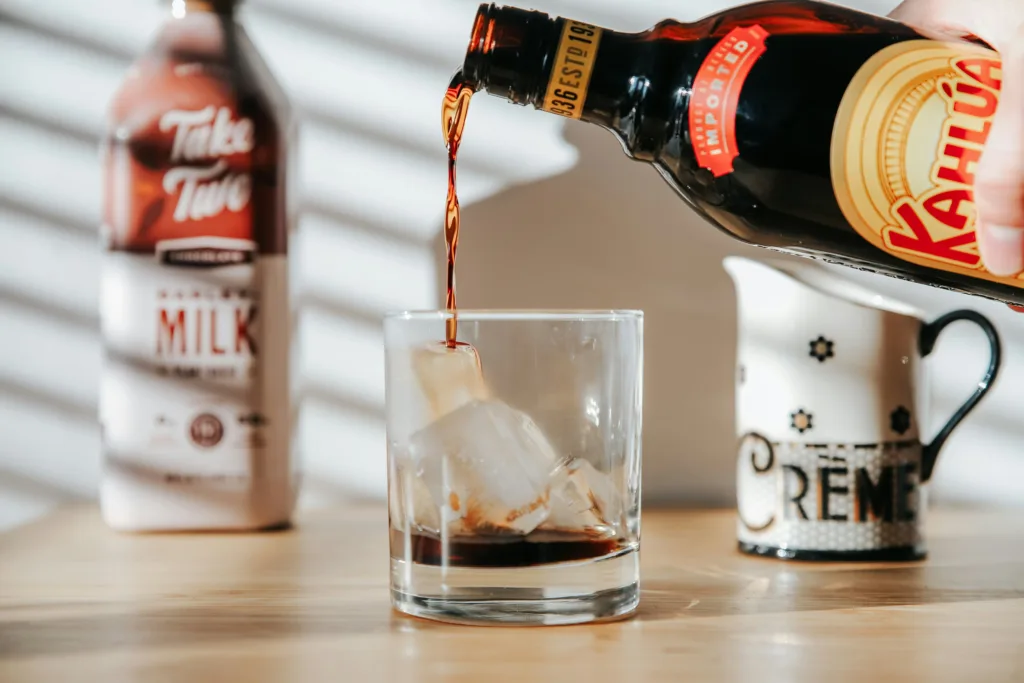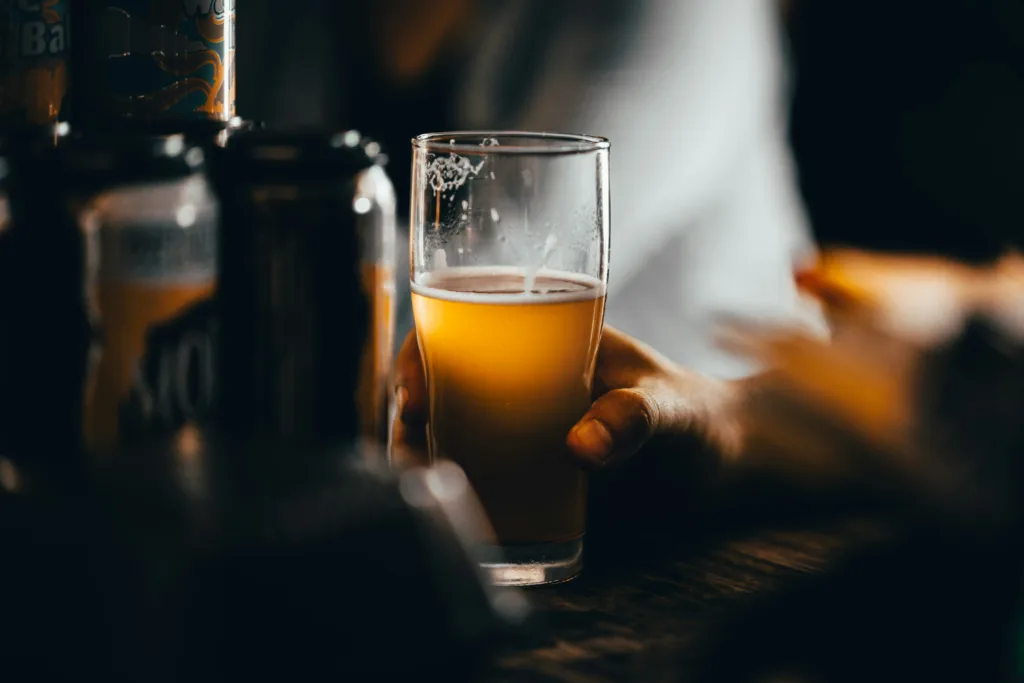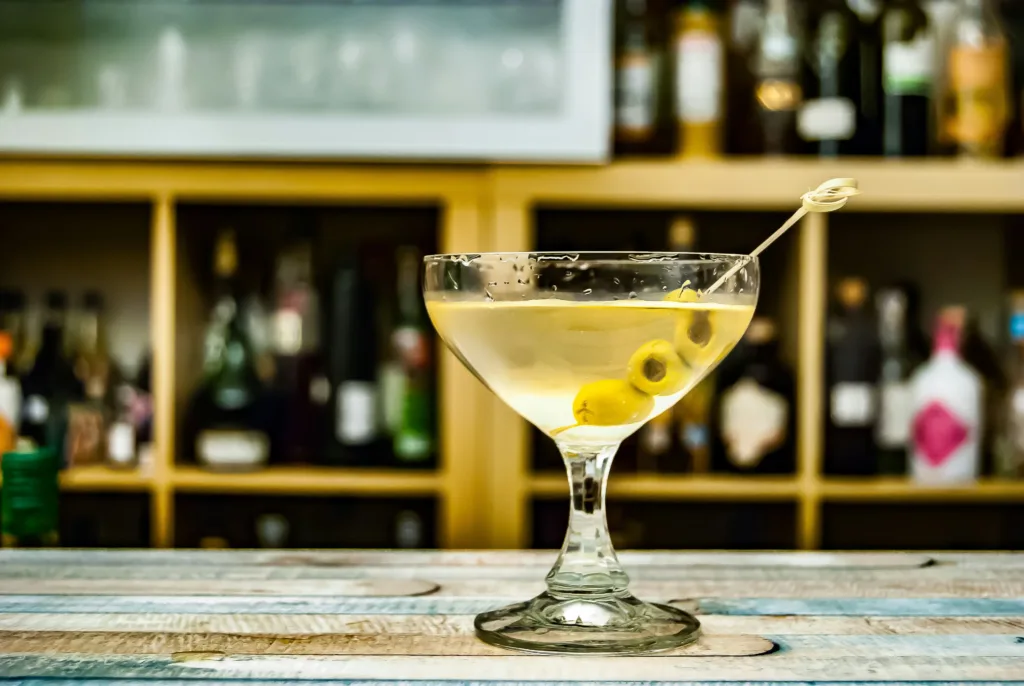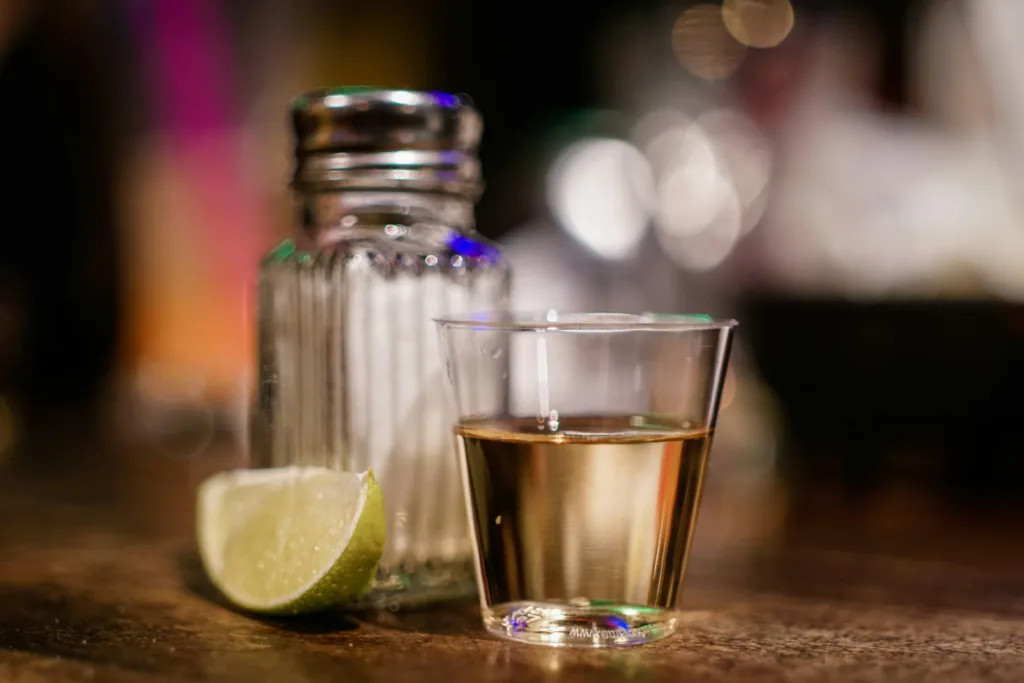Let’s be real – alcohol isn’t exactly a health food, but if you’re going to enjoy a drink, it helps to know which options are lighter on sugar, lower in calories, or less likely to leave you feeling wrecked the next morning. Whether you’re watching your macros, trying to support your gut, or just want to feel a bit better after happy hour, there are choices that lean healthier than others. In this guide, we’re breaking down the alcoholic drinks that tend to be gentler on your body without cutting out the fun completely.
At ReciMe, we’re not here to judge your drink order – but we do care about helping you make food choices that support your lifestyle. Our app makes it easy to save recipes from anywhere, build balanced meal plans, and generate smart grocery lists in seconds. So if you’re sipping mindfully and still want your meals to stay on track, we’ve got you. Grab ReciMe now, stay on top of your nutrition, and let’s get into the healthiest alcohol picks.

Download for free from the App Store on iPhone and iPad

ReciMe Android App

1. Red Wine
Red wine tends to come up often in conversations about healthier alcohol options, mostly because of what’s left in during fermentation – the skins and seeds of the grapes. That process keeps certain plant compounds like resveratrol and quercetin in the mix, which might have some heart and gut benefits. These compounds, like resveratrol, have potential benefits, but evidence on cardiovascular function and insulin sensitivity is mixed, with some studies showing no significant impact, and benefits may depend on gut bacteria activity.
It also helps that most of the grape’s sugar gets converted into alcohol, so red wine usually ends up being lower in sugar than you might expect. Still, it’s not perfect for everyone. Many red wines contain sulphites, which can cause issues if you’re sensitive to them. If you’ve had bad reactions to wine before, this could be a reason.
Key Highlights:
- Contains plant compounds like resveratrol and anthocyanins
- Lower sugar than many other alcoholic drinks
- Often preserved with sulphites
Who it’s best for:
- People looking for a lower sugar alcohol option
- Those interested in potential heart and gut benefits
- Drinkers who tolerate sulphites well
2. Champagne
Brut champagne (the dry kind) is one of the lowest sugar alcoholic options out there. It shares some plant compounds with white wine, although not quite as many as red. While the nutritional impact is minimal, brut champagne’s lower calorie and sugar content make it a suitable option for those aiming to reduce alcohol’s impact, though all alcohol carries health risks.
That said, the bubbles aren’t just for show – carbonation speeds up alcohol absorption. So even if the drink looks light, it can hit harder than expected, especially if you go for multiple glasses.
Key Highlights:
- Dry ‘brut’ types are low in sugar and calories
- Contains light plant compounds from grapes
- Alcohol may hit faster due to carbonation
- Usually served in small portions
Who it’s best for:
- People cutting back on sugar or calories
- Anyone wanting a lighter drink option
- Those who prefer bubbly over still drinks
3. White Wine
White wine skips the grape skins during fermentation, which means it doesn’t carry quite the same level of beneficial compounds you find in red wine. Still, some plant elements stick around depending on the grape and how it’s made. Dry white wines also tend to be lower in sugar than sweet or medium varieties, and the alcohol content is often a bit lower than red.
Some people experience headaches from red wine but not white, possibly due to higher histamine or tannin content in red wine, though the exact reasons remain unclear. For people with that sensitivity, white wine might be the safer pick.
Key Highlights:
- Lower in sugar than sweeter wines
- Often has less alcohol than red wine
- Contains small amounts of beneficial plant compounds
- May be easier to tolerate for some people
Who it’s best for:
- People sensitive to red wine
- Drinkers looking for a lower-alcohol option
- Those who prefer a lighter taste

4. Organic Wine and Liquor
Organic wine and liquor are made from ingredients that haven’t been treated with synthetic pesticides or fertilizers, which is a plus for people who care about where their food and drink come from. Instead of cutting corners with chemicals or additives, these drinks focus on using naturally grown grapes or grains, keeping the process as clean as possible. Organic wines and liquors are not inherently nutritional, and while they may reduce exposure to synthetic pesticides, the health benefits of this are minimal compared to alcohol’s risks
The taste is a bit different too. Organic wines often reflect the land and conditions they were grown in, and organic spirits tend to skip artificial flavorings, which can mean a cleaner finish. For people who care about sustainability, organic alcohol also usually comes with fewer environmental downsides, like less soil pollution or synthetic runoff.
Key Highlights:
- Made from ingredients grown without synthetic pesticides or fertilizers
- Often contains fewer artificial additives or preservatives
- May offer a cleaner, more natural taste
- Focus on sustainable and eco-friendly production
Who it’s best for:
- People who prefer products with minimal chemical exposure
- Drinkers looking for environmentally conscious choices
- Those sensitive to additives in conventional alcohol
5. Bloody Mary (Cocktail)
The Bloody Mary isn’t just a brunch classic – it’s also one of the more nutrient-packed cocktail options out there. Its base of tomato juice brings in things like vitamin C, potassium, and lycopene, an antioxidant that’s been linked to heart and cell health. Of course, the vodka adds alcohol without much else, but it’s balanced by the spice-heavy mix of Worcestershire, hot sauce, pepper, and celery salt.
It’s definitely not low-sodium, and how healthy it is depends a lot on how it’s made. Still, if you’re reaching for a cocktail and want something savory with actual food-based ingredients, this one’s hard to beat. Some people also find the mix easier to sip slowly, which naturally helps with pacing.
Key Highlights:
- Tomato juice provides lycopene and other nutrients
- Includes savory spices instead of sweet mixers
- Can be customized with fresh or lower-sodium ingredients
- Often consumed more slowly than sweet cocktails
Who it’s best for:
- People who prefer savory over sweet drinks
- Anyone looking for alcohol with actual food-based ingredients
- Brunch drinkers wanting something with more body
6. Craft Beer
Craft beer is all about variety. Depending on the brew, it can bring in plant compounds from barley and hops, B vitamins, and even a small amount of protein. While still alcoholic, craft beer may contain micronutrients like B vitamins from barley and hops, but these are minimal and do not outweigh alcohol’s health risks. The brewing process, yeast, and temperature all influence what ends up in the glass.
That said, not all craft beers are the same. Some are higher in alcohol, others are stronger in hops or malt. But when enjoyed in moderation, they offer a different kind of profile than mass-produced beer, both in taste and complexity. The diversity also lets people choose brews that align with their dietary preferences, like unfiltered options or low-ABV picks.
Key Highlights:
- May contain plant compounds from barley and hops
- Has B vitamins and small amounts of protein
- Wide variety in brewing styles and alcohol levels
- Can be chosen based on taste or ingredient preferences
Who it’s best for:
- Beer lovers looking for something beyond mainstream lagers
- People interested in plant-based or less processed alcohol
- Anyone curious about how brewing impacts nutritional value

7. Low-Alcohol Beer
Low-alcohol beer offers many of the same upsides as regular beer, just with less alcohol. It still contains compounds from hops and barley that may have anti-inflammatory effects, especially after physical activity. Low-alcohol wheat beer (around 0.5% ABV) may reduce post-exercise inflammation and support hydration due to its isotonic profile, but evidence is limited and applies primarily to non-alcoholic versions.
While it’s not a health drink, it’s an option for those who want the flavor and feel of beer without as much alcohol.
Key Highlights:
- Retains plant compounds like polyphenols from hops and barley
- Contains natural plant oestrogens
- Hydrating qualities in low-alcohol formats
Who it’s best for:
- People who want a beer taste without the buzz
- Active individuals looking for light recovery drinks
- Menopausal women curious about natural phytoestrogens
8. Hard Kombucha
Hard kombucha takes regular kombucha – fermented tea with live cultures – and adds an extra step to raise the alcohol level. The result is a slightly boozy, tangy drink that still keeps some of the probiotics and organic acids found in its non-alcoholic counterpart. It also tends to come in all kinds of flavors, from fruity and floral to herbaceous blends.
Since it’s fermented twice, it stays fizzy and usually has less sugar than most pre-mixed drinks. While hard kombucha contains alcohol, which may reduce probiotic benefits, it retains small amounts of B vitamins and organic acids, though these are unlikely to significantly impact health.
Key Highlights:
- Includes probiotics from live fermentation
- Naturally flavored with tea, fruit, herbs, or spices
- Less sugar than many ready-to-drink cocktails
- Keeps some digestive benefits from regular kombucha
Who it’s best for:
- People who already drink kombucha and want a stronger version
- Anyone looking for alternatives to sweet mixed drinks
- Drinkers interested in fermented or gut-friendly options
9. Vodka and Gin
Vodka and gin aren’t winning any awards for nutrition, but they’re still go-to choices for a reason. If you’re keeping things lighter, they usually have fewer calories and almost no sugar – especially if you skip the sugary mixers and stick to soda water or just drink it straight. You won’t get the antioxidants you’d find in wine or hops, but you’re also not loading up on additives or flavorings either.
Out of all the spirits, clear ones like vodka and gin tend to be a bit easier on your system compared to darker liquors like whiskey, which come with something called congeners – basically, the stuff that might make hangovers worse. Drinking it “on the rocks” is about as simple as it gets, but keep in mind it’s still pretty strong, so pace yourself.
Key Highlights:
- Lower in calories and sugar when served plain
- Fewer additives than flavored or sweetened cocktails
- Less likely to cause hangovers than darker liquors
- Neutral taste that’s easy to pair or sip solo
Who it’s best for:
- People keeping an eye on calories or sugar
- Drinkers who like things clean and simple
- Anyone skipping mixers but still wants a solid drink

10. Martini (Cocktail)
The Martini’s kind of the minimalist of the cocktail world. It’s just gin or vodka, dry vermouth, and a garnish – lemon twist if you’re feeling zesty, olive if you’re going classic. No sugary syrups, no juices, no fuss. That simplicity keeps the calorie count lower than most cocktails, and the taste? Crisp, botanical, and surprisingly adjustable depending on how it’s made.
If you go with gin, you’re even getting a bit of herbal flair from the botanicals – not enough to call it healthy, but hey, it’s something. Just don’t expect sweetness here; the Martini leans dry and strong, which is part of its whole vibe.
Key Highlights:
- Simple ingredient list with no sweeteners
- Lower in calories than most cocktails
- Can include subtle plant notes from gin
- Served straight up, no dilution from mixers
Who it’s best for:
- Fans of no-frills, strong drinks
- Anyone avoiding sugar or extra ingredients
- People who want something clean and classic
11. Margarita
Margaritas are fun – sweet, sour, salty, and strong all in one glass. The classic mix is tequila, lime juice, and orange liqueur, with or without that salty rim. It’s bold and flavorful, which is why it shows up on nearly every drink menu.
But if you make it at home with fresh lime juice and skip the store-bought mix, you can dial down the sugar and still keep the punchy citrus vibe. Plus, lime gives you a little vitamin C bonus. Not a health drink by any means, but one you can tweak to make a little lighter.
Key Highlights:
- Fresh lime adds tartness and a bit of vitamin C
- Easy to adjust sugar levels depending on how it’s made
- Three main ingredients – no complicated syrups needed
- Salt rim gives it a fun savory contrast
Who it’s best for:
- People who love bold, citrusy drinks
- Anyone who prefers tequila over other spirits
- Drinkers who want a simple recipe with room to customize
12. Hard Cider
Hard cider’s got a fruitier personality than beer, and it leans naturally sweet – especially if it’s made with honey. Think apple-forward with a floral twist, depending on the brand. It’s basically fermented apple juice, and sometimes the honey’s added in later to balance the flavor.
There’s some sugar in there (it is apple-based, after all), but it’s not artificial-tasting like a lot of premixed drinks. Plus, cider is gluten-free by nature, which makes it a solid option if you’re avoiding beer for dietary reasons. Bonus: honey brings a tiny bit of antioxidants and minerals, even if it’s not enough to count as a wellness drink.
Key Highlights:
- Made from apples and sometimes honey
- Slightly sweet, naturally fruity taste
- Fermented, so flavor varies by batch
- Gluten-free and a bit more mellow than beer
Who it’s best for:
- People who like their drinks on the fruity side
- Drinkers looking for a gluten-free option
- Anyone who wants something smooth and easy without heavy booze vibes
13. Hot Toddy
There’s just something about a Hot Toddy that feels like it’s doing you a favor while you sip it. It’s simple: hot water, lemon juice, honey, and a splash of whiskey. That’s it – though if you want to get fancy, you can toss in a cinnamon stick or a clove or two. The lemon brings a bit of vitamin C, the honey adds a little natural soothing power, and the warmth alone can help you breathe easier on a chilly night.
Is it a health drink? Not really – but it’s not drowning in sugar or weird mixers either. It’s cozy, slow to sip, and honestly kind of comforting. If you’re reaching for something warm and boozy when it’s cold out, this one’s a solid option that doesn’t overdo it.
Key Highlights:
- Made with basic ingredients like lemon, honey, and whiskey
- You can add tea or spices if you’re into that
- Served warm, which naturally slows down how fast you drink it
- Lower in sugar compared to most cocktails
Who it’s best for:
- People craving a cozy drink in cold weather
- Anyone who prefers something warm, not sweet
- Drinkers who want fewer ingredients without losing the comfort factor

14. Tequila on the Rocks
Tequila might not scream “healthy choice” right away, but honestly? When you keep it simple – just poured over ice, no mixers, no extras – it’s not a bad pick. Especially if you’re going with blanco or silver tequila (the clear, unaged kind). It’s made from blue agave, so it’s naturally gluten-free, and you’re skipping the sugar you’d normally get from mixers or syrups.
Blanco is usually the cleanest option too – less chance of hidden additives compared to aged versions like reposado or añejo, which can pick up extra stuff from the barrels. Sure, it’s still strong, so go easy. But if you’re after a straightforward drink that keeps things minimal, tequila on the rocks does the trick.
Key Highlights:
- Naturally gluten-free, made from blue agave
- No sugar or mixers if you drink it straight
- Blanco is usually the cleanest version
- Just ice – nothing else needed
Who it’s best for:
- People who want a minimalist drink
- Drinkers avoiding sugar, gluten, or extra calories
- Anyone who likes their spirits clean and simple
15. Vodka Soda
Vodka Soda is about as stripped-down as a drink gets – and that’s the appeal. It’s just vodka, soda water, and maybe a slice of lime if you’re feeling a little festive. There’s no sugar, no color, no extras. It’s light, easy to track, and works whether you’re out at a bar or mixing something at home that won’t derail your night.
And because it’s so neutral, it plays nice with just about anything. Add mint, a splash of grapefruit, even cucumber – you can dress it up without making it heavy. Plus, it doesn’t have the darker alcohol stuff (called congeners) that people say can make hangovers worse. So if you’re looking for a drink that keeps it clean, this one’s a solid go-to.
Key Highlights:
- No sugar, no coloring – just the basics
- Lower in calories than juice- or syrup-based cocktails
- Easy to customize without overcomplicating things
- Skip the hangover triggers from darker liquors
Who it’s best for:
- Anyone keeping an eye on sugar or carbs
- People who like a clean-tasting drink
- Those looking for a light, go-anywhere option
- Drinkers trying to avoid next-day regret
Conclusion
Let’s be honest – no alcohol is going to win a nutrition award. But if you’re going to have a drink, it’s helpful to know which ones aren’t loaded with sugar or extra stuff your body doesn’t need. Whether it’s a no-fuss Vodka Soda, a zesty Margarita made from scratch, or a cozy Hot Toddy when the weather’s rough, the lighter options tend to be the ones with fewer ingredients and less sweetness.
There’s no “perfect” drink for everyone, and that’s fine. Some folks want something strong but clean, others want something cozy that won’t wreck their sleep. It all comes down to what works best for you. So sip what you enjoy – just do it in a way that fits your vibe.
